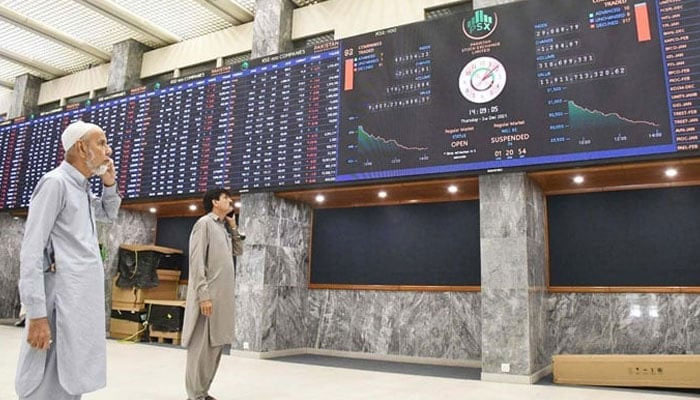Rise and rise of KSE-100 index: analysts weigh in
KARACHI: Pakistan’s stock market reached an all-time high on Wednesday, with the benchmark KSE-100 index closing above 80,000 points. Analysts attribute this surge to several factors, including optimism surrounding the International Monetary Fund (IMF) bailout package, low inflation rates, and resilient investor sentiment despite tough taxation measures in the FY25 budget.
The Pakistan Stock Exchange’s (PSX) benchmark KSE-100 share index increased by 680.78 points or 0.86 per cent to 80,233.67 points against 79,552.89 points recorded in the last session. The highest index of the day remained at 80,405.24 points, while the lowest level was recorded at 79,697.25 points.
CEO of Topline Securities Mohammed Sohail highlighted the importance of the IMF programme in stabilizing Pakistan’s economy: “Investors are hopeful that long-term IMF funding will stabilize the economy and Pakistan will be able to overcome economic challenges,” adding that despite the bullish market, the market trades at a low price-to-earnings (PE) ratio of close to four times, indicating undervalued equities.
Muhammad Awais Ashraf, an analyst at AKD Securities, pointed out that the KSE-100 index’s strong performance is a result of adopting tight fiscal and monetary policies, along with timely external payments and a smooth government transition.
According to Awais, entering a larger IMF programme amid monetary easing would boost investor confidence in equities, with the KSE-100 trading at a forward PE ratio of 3.6 times. Ashraf also mentioned the increasing inflows of foreign investments into equities, noting that in FY24, foreign net purchases reached a 10-year high of $157.4 million.
Ahsan Mehanti, an analyst at Arif Habib Corp, stated that the FY25 budget is capital market friendly due to the government’s tax policy, which aims to attract both local and foreign investors. “Investors expect record dividend payouts from state-owned enterprises (SOEs) and the power sector owing to recent government initiatives to settle circular debt,” Mehanti said. He added that the IMF bailout deal would help stabilize the rupee and manage debt repayments effectively.
Mehanti also noted the impressive performance of the stock market during the corporate earnings season, supported by strong economic data. “The stocks closed at all-time highs amid upbeat data showing $30.7 billion in exports, a 10.54 per cent increase, and a trade deficit narrowing by 12.3 per cent to $24.09 billion in FY24,” he explained. He attributed the market’s performance to the government’s timeline for privatizing SOEs and expectations for strong corporate payouts, which played a crucial role in the record close.
The market’s upward trajectory demonstrates investors’ positive outlook, fuelled by expectations of economic stabilization through the IMF programme and the government’s pro-business policies.
As Pakistan navigates through its economic challenges, the stock market’s performance is a testament to the resilience and potential of thecountry’s financial markets. The combination of supportive government policies, anticipation of the IMF bailout package, and strong economic indicators have collectively driven the KSE-100 index to new heights.
Analysts remain optimistic that these factors will continue to support the market’s growth, potentially leading to further gains in the coming months.
-
 Katie Price Drama Escalates As Family Stays In Touch With Ex JJ Slater
Katie Price Drama Escalates As Family Stays In Touch With Ex JJ Slater -
 Critics Target Palace Narrative After Andrew's Controversy Refuses To Die
Critics Target Palace Narrative After Andrew's Controversy Refuses To Die -
 Sarah Ferguson’s Delusions Take A Turn For The Worse: ‘She’s Been Deserted’
Sarah Ferguson’s Delusions Take A Turn For The Worse: ‘She’s Been Deserted’ -
 ICE Agents 'fake Car Trouble' To Arrest Minnesota Man, Family Says
ICE Agents 'fake Car Trouble' To Arrest Minnesota Man, Family Says -
 Camila Mendes Reveals How She Prepared For Her Role In 'Idiotka'
Camila Mendes Reveals How She Prepared For Her Role In 'Idiotka' -
 China Confirms Visa-free Travel For UK, Canada Nationals
China Confirms Visa-free Travel For UK, Canada Nationals -
 Inside Sarah Ferguson, Andrew Windsor's Emotional Collapse After Epstein Fallout
Inside Sarah Ferguson, Andrew Windsor's Emotional Collapse After Epstein Fallout -
 Bad Bunny's Star Power Explodes Tourism Searches For His Hometown
Bad Bunny's Star Power Explodes Tourism Searches For His Hometown -
 Jennifer Aniston Gives Peek Into Love Life With Cryptic Snap Of Jim Curtis
Jennifer Aniston Gives Peek Into Love Life With Cryptic Snap Of Jim Curtis -
 Prince Harry Turns Diana Into Content: ‘It Would Have Appalled Her To Be Repackaged For Profit’
Prince Harry Turns Diana Into Content: ‘It Would Have Appalled Her To Be Repackaged For Profit’ -
 Prince William's Love For His Three Children Revealed During Family Crisis
Prince William's Love For His Three Children Revealed During Family Crisis -
 Murder Suspect Kills Himself After Woman Found Dead In Missouri
Murder Suspect Kills Himself After Woman Found Dead In Missouri -
 Sarah Ferguson's Plea To Jeffrey Epstein Exposed In New Files
Sarah Ferguson's Plea To Jeffrey Epstein Exposed In New Files -
 Prince William Prepares For War Against Prince Harry: Nothing Is Off The Table Not Legal Ways Or His Influence
Prince William Prepares For War Against Prince Harry: Nothing Is Off The Table Not Legal Ways Or His Influence -
 'How To Get Away With Murder' Star Karla Souza Is Still Friends With THIS Costar
'How To Get Away With Murder' Star Karla Souza Is Still Friends With THIS Costar -
 Pal Reveals Prince William’s ‘disorienting’ Turmoil Over Kate’s Cancer: ‘You Saw In His Eyes & The Way He Held Himself’
Pal Reveals Prince William’s ‘disorienting’ Turmoil Over Kate’s Cancer: ‘You Saw In His Eyes & The Way He Held Himself’




